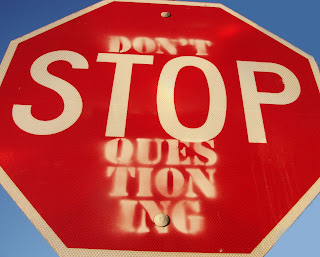I have recently become more familiar with the life and times of Buckminster Fuller. When I think deeply about the spirit of inquiry, I find it useful to learn about those who personify it, and Buckminster, or "Bucky" as he was oft referred to, had to be a premium example.
In his 1970 book I Seem To Be a Verb, he wrote,
I live on Earth at present, and I don't know what I am. I know that I am not a category. I am not a thing—a noun. I seem to be a verb, an evolutionary process—an integral function of the universe. Buckminster FullerThis quote reminded me of Robert Sylwester, another individual that beyond a shadow of a doubt for me, personifies the spirit of inquiry, I think mostly because of the Buckminster Fuller reference to "being a verb." Verbs connote actions, or movement. In another post here I explained that we (human beings) are in constant motion; traveling in simultaneous physical, psychological, emotional, and cognitive realms. Robert Sylwester characterizes this need to be in motion ...
The planning, regulation, and prediction of movements are the principal reasons for a brain. Plants are as biologically successful as animals, but they don’t have a brain. An organism that’s not going anywhere of its own volition doesn’t need a brain. It doesn’t even need to know where it is. What’s the point? Being an immobile plant does have its advantages however. Plants don’t have to get up every day and go to work because they’re already there.
On the other hand, if an organism has legs, wings, or fins, it needs a sensory system that will inform it about here and there, a make-up-its-mind system to determine whether here is better than there or there is better than here, and a motor system to get it to there if that’s the better choice – as it is, alas, when we have to go to work.I think that learning can be described as movement; multiple journeys over a lifetime in the simultaneous physical, psychological, emotional and cognitive realms. I believe the process of inquiry provides us with opportunities to travel the most engaging pathways on these journeys, perhaps, fortunately, the ones less traveled by.
Buckminster Fuller and Robert Sylwester both present learning as a process that does not stand still. Young children certainly understand that learning doesn't stand still. They have a hard time standing still for any reason. Moving and evolving (aka learning) is a natural state for kids. In another post here I addressed the natural learning tendencies of preschool kids. Kids have massive learning potential in the first five years of life before educators even meet them in kindergarten. Kids are curious, inquisitive and unafraid for the most part to make learning mistakes. Play is learning for them in these formative years. Virtually everything they do at this stage of life teaches them something. It seems like Buckminster and Robert are on to something.








